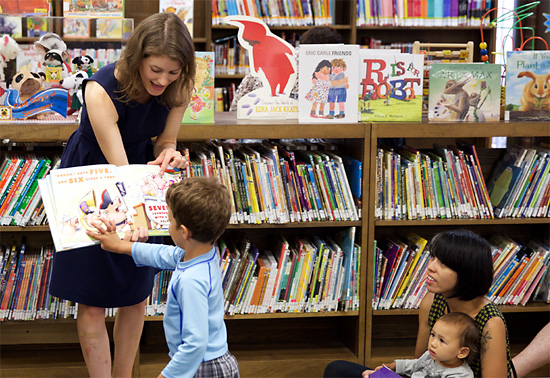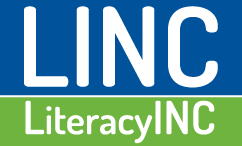The Harvard Family Research Project separated from the Harvard Graduate School of Education to become the Global Family Research Project as of January 1, 2017. It is no longer affiliated with Harvard University.
September 8, 2016
Pinkerton Foundation’s Neighborhood Literacy Initiative: Greater Than the Sum of Its Parts
Danielle Pulliam

How can communities join together to ensure that all children are proficient readers by the time they enter third grade?
We at The Pinkerton Foundation believe that the answer to this question lies in the power of bringing schools and community organizations together to connect with children and families at different settings and stages in a child’s life, creating a pathway for family engagement as children develop. To put this idea into action, we began funding the Neighborhood Literacy Initiative–a collaborative of community partners with the collective goal of increasing literacy for children from birth to fifth grade and creating a community culture of reading. As part of this initiative, in 2014 The Foundation began funding programs in South Jamaica, Queens, and in 2015 added East New York, Brooklyn. To date, The Foundation has invested more than $6 million in grants to support these programs, now known as South Jamaica Reads and East New York Reads. The partners include:
For Families With Children Birth Through Age 5

Reach Out and Read of Greater New York, which enlists medical providers to work with low-income parents to emphasize the importance of reading for their young children.

The Parent Child Home Program, which sends home visitors to work with low-income families to prepare their children, age 16 months to 4 years, to be “school-ready.”
![]()
Jumpstart for Young Children, which employs college students to work one-on-one with preschool children to prepare them for kindergarten and beyond. Jumpstart volunteers also provide literacy tutoring at the library.
For Families With Children Kindergarten Through Fifth Grade
| READ Alliance, which pairs teen tutors with struggling kindergarten and first-grade readers in the afterschool hours. | |
 |
Literacy Inc.’s (LINC) Reading Buddies program for first and second graders, which brings older youth to read with younger children. LINC also trains parent volunteers to stage reading celebrations and read aloud in medical offices, apartment complexes, parks, and other public places. |
 |
Learning Leaders, which joins with LINC to train parents to become effective in-school volunteers. |
| Reading Partners, which enlists and trains adult volunteers to work with third-, fourth-, and fifth-grade students in one-on-one tutoring. | |
| Summer Advantage USA, a specialist in out-of-school-time learning, which provides comprehensive academic programming during the summer in an effort to prevent summer learning loss. |
A number of the programs also span across age ranges and community organizations. For example, a Family Academy, offers parents and children opportunities to explore important topics together, such as test anxiety. Through the literacy “passport” program, when parents attend family activities and literacy events with their children, they earn stickers for their passport, which entitles them to discounts at more than 30 participating community businesses.
The Library as an Anchor
Given the range of services of partnering organizations, it was essential to have an anchoring institution for the initiative. The library was the natural choice for us for a number of reasons: children and families of any age can get engaged with the library; the library was already a part of the community landscape; and all of the partnering organizations referred participants to the library for additional resources and opportunities.
With funding from The Foundation, an early literacy program coordinator was hired to work with two Brooklyn Public Library branches to support their foundational role. And funding allowed one library branch from the Queens Library to remain open on Saturdays and to hire a children’s librarian. Today, that library continues this staffing and schedule through its own revenue stream, but it was the initial funds from the collaborative that made the need and demand for these hours of operation apparent. The extended services from this partnership allow the library branches to be an important asset and resource for children, families, and the community.
Lessons Learned
Through this experience, we have learned quite a bit about collaboration with and among community agencies.
- Collaboratives must be built slowly and over time without fear of competition. As an initial step in building this initiative, we convened more than a dozen of our grantees whose mission had a literacy focus. We then mapped the locations of their program sites to find where there was an overlap. Unfortunately, there was little or no coordination among them. As a way of building on each other’s work in a neighborhood, we asked the grantees to think about doing business differently and strategically working with their peer organizations. As you might expect, there was some initial skepticism. Many grantees were concerned about the current funding of programs. The Foundation committed to continue funding existing grants and provided additional funds for new work. Our hope was simply to empower them to form a cohesive group and generate ideas about how they could build a literacy continuum that permeates the culture of the community and ripples out past the boundaries of the neighborhood.
- Using data is important for promoting progress. The groups chosen had already tested models that demonstrated positive outcomes. But to fully understand the impact of The Foundation’s investment, we engaged Algorhythm, a research and evaluation firm, to conduct an independent study to understand the impact of the collaboration and the flow of information and referrals among the groups. Anecdotally, we’ve heard from principals that the initiative has increased both student literacy growth and family engagement. And we’ve also been hearing that the initiative has greatly reduced community stigma around poor literacy. Prior to the collaboration, many adults said they felt ashamed or embarrassed about their own struggles with literacy, but today, libraries and community organizations are reporting that families are now feeling more comfortable sharing their own literacy challenges and reading more.
We hope that others can learn from and build on our work. Individually, community groups can change outcomes for children, but together they are changing the culture of entire communities. The whole can definitely be greater than the sum of its parts.
Danielle Pulliam is the program officer for the Neighborhood Literacy Initiative, which is funded by The Pinkerton Foundation, an independent grantmaking organization in New York City.

